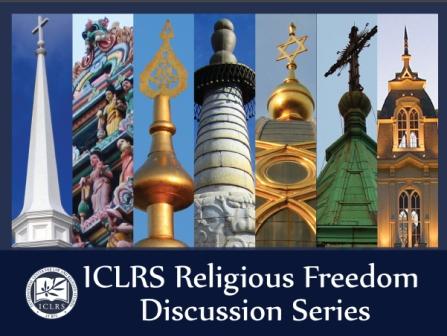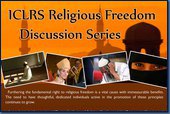Religious Freedom Discussion Series

The right to freedom of religion is increasingly vulnerable worldwide. Recent studies find that 77 percent of the world’s population live under high or very high restrictions on religious freedom, and restrictions in many nations, from Africa to Asia, from the United Kingdom to the United States, are rising rapidly. Helping people understand and effectively respond to the challenges of protecting this fragile right is the work of the International Center for Law and Religion Studies of Brigham Young University’s J. Reuben Clark Law School.
As part of this work, the Center was pleased to sponsorm during the years 2011, 2012, and 2013, the Religious Freedom Discussion Series. The lectures, followed by a brief question & answer period, were held at BYU…

The International Center for Law and Religion Studies announces the third Religious Freedom Discussion Series. The lectures, followed by a brief question & answer period, are held in room 472 JRCB on the campus of Brigham Young University at noon on six Wednesdays each year, and are simulcast by limited-space Webinar to listeners worldwide. The public is invited to attend the lectures in person. For those joining by Webinar, early registration to secure a place is encouraged. Webinar links are available on iclrs.org one week before each lecture.
The right to freedom of religion is increasingly vulnerable worldwide. Recent studies find that 75 percent of the world’s population live under high or very high restrictions on…

The International Center for Law and Religion Studies (ICLRS) was pleased to host the second Religious Freedom Discussion Series, which featured bi-monthly lectures throughout the year by globally recognized religious freedom and comparative law experts who direct the work of the Center. The Lectures were given at the J. Reuben Clark Law Building on the campus of Brigham Young University and were simulcast by limited-space Webinar.
Reports on and recordings of the lectures, as well as available PowerPoint presentations or texts, are available by clicking the event…
Religious Freedom Discussion Series 2011

The International Center for Law and Religion Studies (ICLRS) at Brigham Young University and the Community Service Outreach Committee of the J. Reuben Clark Law Society (JRCLS) have presented the first Religious Freedom Discussion Series—a bi-monthly forum led by the globally recognized religious freedom experts who serve as the ICLRS leadership. Lectures are delivered at the Law School and are available as live Internet webinars. Information about the 2011 presentations, including links to recordings, print addresses, and PowerPoint…
Summary of Lecture by Dr. David M. Kirkham
By Natalie Wright Romeri-Lewis
Professor David M. Kirkham’s presentation on “Human Rights, the Constitution, and Religious Liberty” instructed us on the various intellectual origins of the US Constitution. The Constitution’s “ideals and ideas” is the accumulation of the laws and philosophies of classical antiquity, English Common Law, the English Commonwealth, Enlightenment Rationalism, Puritan Covenant Theology, and other Christian thought. The framers were also influenced by their own state constitutions, geopolitical institutions, compromises, and other political-economic ideas. Of special interest is that at least five “state Constitutions required a test of faith before running for office.” Although the Constitution’s checks and balances reflect “a construction of Enlightenment counterpoints,” the resulting document also reflects the Puritan ideal that American would set an example for the world. Thus, because “religion was as pervasive in the 18th Century as in the 17th, religion did affect the Constitution.”
Professor Kirkham then contrasted the US Constitution with the Universal Declaration of Human Rights (“UDHR”). He explained that “the UDHR is not a constitution and is not binding, reads more like a Bill of Rights, but is more like a Declaration of Independence.” Although a few non-Western nations helped draft the UDHR, Professor Kirkham asked whether the UDHR “is a Western document emphasizing individual liberties or a declaration of civil [or innate (by virtue of one’s birth)] rights?” Kofi Annan stated that “no one list of rights is a blueprint for all countries.” In response, China asserts that “a nation’s political and economic history requires rights to be relative within each country.” This approach “concerns human rights activists that the UDHR will become meaningless if enough countries see it this way.”
Professor Kirkham encouraged attendees and those interested in religious freedom to join the debate: “We should embrace the UDHR and its language and dispute the evolution of rights when the discussion does not really include God-given rights. Don’t fear and stay out of the discussion. . . . We can embrace the language of the UDHR and be uncomfortable with some peoples’ interpretations of the language. If same-sex marriage is discussed as a human right, we need to join the debate and ask, ‘Where does it get its universality, as does heterosexual marriage?’ “
The full presentation and Professor Kirkham’s helpful PowerPoint slides are all available here.